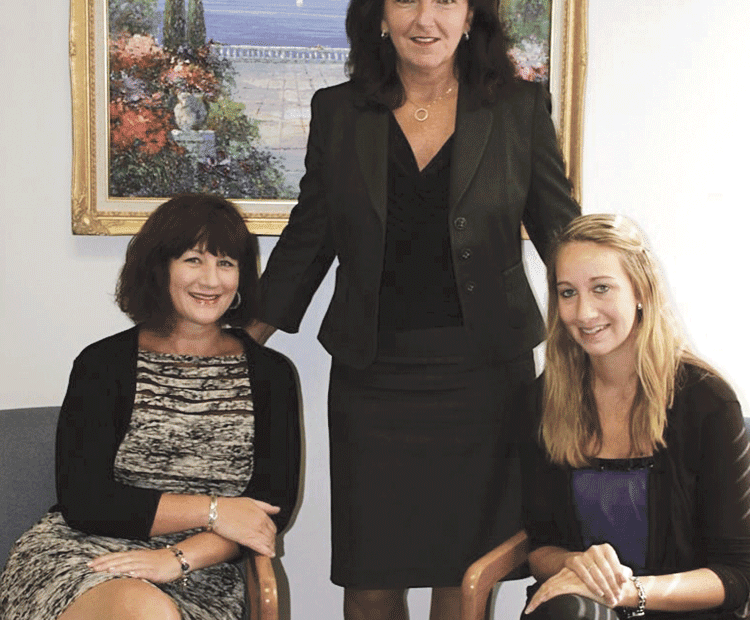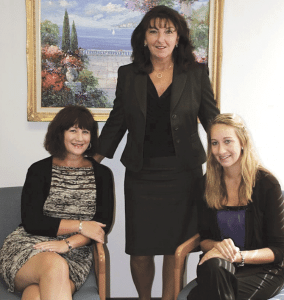
Getting Down to Business
An Energized State Massachusetts Chamber of Commerce Focuses on the Big Picture

Debra Boronski (center) with two Massachusetts Chamber employees, Heidi Brodeur (left), director of membership services, and Noelle Myers, events and communications manager.
“We started as the Massachusetts Chamber of Business and Industry because the name ‘Massachusetts Chamber of Commerce’ was taken,” Boronski said, explaining that an individual registered the moniker in 1989 but never did anything with it. “It took me three years to find him, and once I did, I had to get a letter of consent, and we worked it out.”
Even under its original name, however, Boronski felt her nascent organization filled a badly needed niche in the Bay State.
“There are 43 state chambers in the United States; I founded the 43rd,” she told BusinessWest, explaining how she broke away in 2007 from two decades of work with the Affiliated Chambers of Commerce of Greater Springfield (ACCGS) and, before that, the Chicopee Chamber of Commerce, to lead this new endeavor.
“After having spent 20-something years in local and regional chambers, I really felt that what I could do as a business professional in these arenas was done. I was strongly encouraged by many associates, and I got a great deal of support from other professionals in the chambers and other organizations, to start a Massachusetts Chamber of Commerce.”
Five years later — the organization celebrated that anniversary on Oct. 9 — the Massachusetts Chamber counts about 700 members in its ranks, and Boronsky has a much different job than she used to.
“A state chamber of commerce really focuses its primary efforts on advocacy,” she said. “We aren’t like your local or regional chamber; we don’t do networking events or after-5s, and we don’t get involved in local government and local ordinances. We believe a local chamber is meant to do that, and they do it well.
“But local chambers,” she continued, “have a hard time paying attention to all the laws and regulations being discussed in Boston, and I can say that from experience running the Chicopee Chamber for 10 years and doing work for the Affiliated Chambers for 11 years. They have their hands full with their day-to-day business.”
The role of a state chamber, she explained, is threefold: information, education, and advocacy. “I am a registered lobbyist, and we also employ a lobbying firm in Boston. We are always in the know and informed as to what’s going on today and what’s being planned for tomorrow.”
For this installment of Getting Down to Business, Boronski talks about some of those issues, and the way her organization has expanded, not just in membership, but in scope.
Taking a Stand
Her role begins, however, with advocacy in Boston — a task she believes is critical for member businesses to succeed.
For example, in March, the state Division of Insurance staged a hearing to discuss increasing workers’ compensation rates by almost 20%. “We were the only chamber of commerce there; I was the only CEO at that hearing, testifying against that increase and providing testimony to Division of Insurance representatives about what harm it would do to businesses, small businesses in particular,” Boronski said. “And they did not raise it. I think we made a difference.”
She also pointed to an economic-development bill signed into law in August 2010 that includes two provisions for which the Massachusetts Chamber pushed hard. One raises the cap on small-claims court actions from $2,000 to $7,000, allowing businesses to pursue collection of bigger debts without incurring huge legal expenses, while the other changes the language in procurement rules to ensure that Massachusetts companies are given preference on state contracts. “That’s another great example of the value of a state chamber.”
In addition, Boronski noted, “two and a half years ago, when gaming was being discussed initially, we were the first business organization to submit testimony in support of gaming in Massachusetts. I think that speaks volumes about the value of a state organization being able to look at the big picture and take a broader view of the potential impact — both beneficial and negative — of various initiatives.”
With national and state elections in the rear-view mirror, she said, businesses have a handful of issues they’re particularly concerned with, including healthcare costs and the recently passed law aimed at containing them.
“That’s something we’re keeping a close eye on. That’s where the ‘information’ part of what we do comes in. We can translate what’s happening in Boston and communicate that in such a way that business owners don’t have to pore through pages and pages of publications. We can share with them, ‘this is what’s going on, and this is what you need to be aware of.’”
Another area of focus is proposed tax increases, she noted. “We need to make sure our members know what’s proposed and why we promote or oppose various initiatives. Our ears are always to the ground, making sure that we don’t miss anything.”
Local initiatives involving infrastructure, transportation, and water are also closely tracked. “All these things cost money, so how do we pay for it?” Boronski said. “We want to make sure that we inform those who are making these decisions what the ramifications of their decisions are.
“It’s important that we keep a two-way line of communication open,” she continued. “A lot of times, things simply present themselves — regulations don’t always go before legislative bodies, and those things can happen very quickly. That’s where having our lobbying firm really adds value for businesses that belong to the Massachusetts Chamber; we can provide them with information within hours of learning something.”
Branching Out
The chamber has expanded its role beyond its original mission, however. About two years ago, the West of River Chamber of Commerce, which was looking to break away from the ACCGS, approached the Massachusetts Chamber for management services.
“We became their management company,” Boronski explained, noting that this involves everything from billing and invoicing services to generating marketing materials and running events. And she was grateful for this new opportunity, even as she embraced her organization’s statewide role. “I had missed some of that, working with the local business community, and this allowed me to dip my toe back into the community. And the West of the River Chamber has grown and added programs since then.”
The effort didn’t go unnoticed by the nearby North Central Connecticut Chamber of Commerce, covering the Enfield-Suffield area, which contacted Boronski about taking on a similar management role there. So, sensing a growing opportunity, she launched a subsidiary company, called Chamber Management Services, with an eye on bringing in more clients down the road.
“We see this as a model for the future,” she explained. “There are many chambers of commerce that may not have the financial resources to employ a high-level CEO and Main Street office space, but they still want to provide important networking and advocacy on the local level, and this model allows them to do that.
“It’s extremely important for these chambers to maintain their independence and their individuality; they don’t want to be lumped together,” she added. “And we make sure they have their own phone numbers, their own business cards and marketing programs; they just happen to be managed by the same company.”
Boronski said the arrangement allows the local chambers to share best practices. “What one chamber is doing well can be shared with the other chamber, and vice versa, so they can maintain their independence, but have the ability through management to find out what’s happening elsewhere. And both are interested in doing some cross-border initiatives.”
State of Mind
Having been involved in chamber activity on both a micro and macro scale, Boronski said she’s convinced she made the right call five years ago.
“In 20-something years in local and regional chambers, putting on trade shows, breakfasts, and after-5s, being able to expand my career into this arena, representing businesses, has been a wonderful professional experience,” she said. “I truly enjoy the advocacy portion of my job. You get to have an impact on a much larger level.”
Boronski has also kept busy running for a seat on the East Longmeadow Board of Selectmen, with an election looming this month. “For 25 years, I’ve been working on one side of the table, talking to lawmakers and decision makers about the impact of their decisions. Now I’m looking to fill a seat on the other side of the table so I can help make good decisions. For me, it’s a way to give back. I feel like I can take my skill sets and put them to good use.”
In the meantime, she’s not letting up on efforts to expand the organization she has led for the past five years. About a year ago, she launched the Massachusetts Chamber of Commerce Foundation — “because I didn’t have enough to do,” she said with a laugh. More seriously, though, she explained that this arm was created to raise money for workforce-development efforts through business grants to members. And she’s also taking steps to create a political action committee. “We are constantly evolving and growing.”
The Massachusetts Chamber is also building on its member-benefit center, which businesses can access for things like home- and auto-insurance discounts, training resources, website and merchant card services, and UPS shipping discounts, among others.
“As a large state organization, we’re in a position to negotiate benefit programs with large providers, and we can offer our members significant savings,” Boronski said. “These companies know we have a far reach, and in return our members receive value they wouldn’t otherwise receive.
“It’s the icing on the cake,” she added. “Lobbying and advocacy may be our cake, but we have some good icing, too.”
Joseph Bednar can be reached at [email protected]





